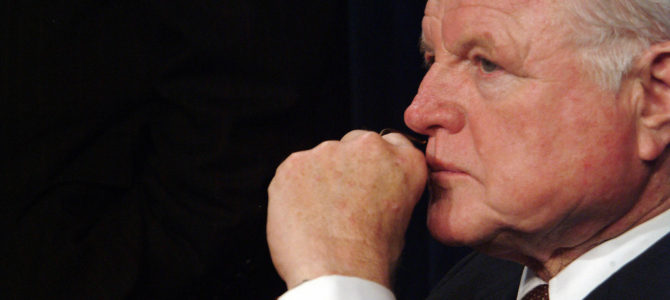
“Chappaquiddick,” the just-released movie about Sen. Ted Kennedy’s 1969 car wreck that killed Mary Jo Kopechne and damaged but did not end his political fortunes, is creating a stir. Reviews have been more positive than one might expect, from both his presumptive fans and foes. Many praise its delicate handling of the event, for not being a simple hit job, its careful adherence to official records, and for preserving ambiguities wherever ambiguities might lay.
Especially welcome at long last is a three-dimensional view of the victim, 28-year-old Mary Jo Kopechne. She was left trapped in the Oldsmobile Kennedy drove off a bridge at midnight after partying on Martha’s Vineyard, just days before the Apollo 11 moon landing. Kennedy managed to get out of the car unscathed, claiming no memory of how he escaped, but he left the scene and didn’t report the accident for 10 hours.
Actress Kate Mara, who plays Mary Jo, brings her to life with a soft-spoken and empathic personality. This portrayal helps fill in one of the biggest blanks in the whole sordid affair, in which the Kennedy clan primarily obsesses over damage control. They are serendipitously helped along by the enormous media and public preoccupation with the moon landing.
The Story’s Villain
Ted Kennedy (Jason Clarke) comes off as predictably selfish and irresponsible. More than once he reverts to utterly childish behaviors, from trying to pin blame on his attorney cousin to watching cartoons on TV as a form of escape. Still, the viewer can feel Kennedy’s deep emotional conflicts throughout. His sense of guilt mixes with the lingering rawness of all three of his brothers’ tragic deaths.
But a more constant motif is the sense of failure Ted felt as the dross of the family—the last surviving son, whom patriarch Joseph Kennedy Sr. hoped to groom to be U.S. president. In the end, it’s not hard to assume that doing the right thing does not come easily for anyone with such a deep, personal investment in fulfilling a destiny others carved out for him.
A lot of reviewers see “Chappaquiddick,” despite its ambiguities, as a long-overdue look at the cowardice of a man who lived 40 more years basking in adulation as the “lion of the Senate.” National Review says “Chappaquiddick Exposes Ted Kennedy at Last,” and the Detroit Free Press says “Chappaquiddick” shows us a “Profile in Cowardice.”
Yet I’m not so sure most people will see it that way. I got some weird vibes while viewing it. Producer Mark Ciardi was available for Q&A after the screening I attended, hosted by The Federalist. He mentioned positive audience reaction at a screening on Martha’s Vineyard, which remains a bastion of liberalism carrying a torch for the Kennedy family mystique.
As I listened to this, something clicked. I wondered if this movie could actually prove more redemptive for Kennedy’s legacy than negative. I asked Ciardi about this possibility, and he agreed that, yes, it could.
Moral Relativism Dissolves Standards of Behavior
If you accept that morality is objective, then you’re less likely to see my point as a possibility. But if you’re an adherent of moral relativism, as are more and more Americans today, then the film can most definitely have that effect.
American culture today is not really invested in standards of morality. If it was, I think most would agree—as did most of the non-Bostonian American public of 1969—that Kennedy’s behavior was inexcusable. Most would agree he shouldn’t get a pass simply because he was part of the Kennedy dynasty. Most would also agree that nobody should be above the law, and that the rule of law should apply equally in charges of manslaughter, no matter your social status.
But today’s world is different. Our opinions are more often formed in the cloud of political correctness, identity politics, and even a culture of death, based on how a given policy may suit one’s appetites. Consistent standards of morality hardly even get lip service today. Instead, we see increasing rationalization for behaviors depending on the social status of the accused.
Yet social status is dependent on political correctness. So rioting can be rationalized away, as can abuse of power. In sum, we see a growing willingness to assume that the end justifies the means.
Manipulating Emotions to Cloud Good Judgment
A turning point in “Chappaquiddick” occurs when Ted Kennedy, surrounded by his fathers’ cronies, finally strategizes his way out of the mess by basically telling them they must appeal directly to that old Kennedy magic. In other words, they must play on the media’s willingness to promote the narrative that the poor little rich kids of the Kennedy clan have undergone massive tragedies—more than most humans could endure.
It all hearkens to the devastating loss of Joe Jr. in World War II, the 1963 assassination of JFK in Dallas, and the 1968 assassination of RFK in Los Angeles. (You’ll note that the lobotomy and subsequent institutionalization Joe Kennedy Sr. is reported to have forced on his daughter Rosemary doesn’t seem to enter this litany, but perhaps that’s a story for a future film.)
So, in the end, Kennedy decided to appeal directly to the voters of Massachusetts in a nationally televised speech carried on all three major networks at the time. In it, he plaintively explained the events of that night, how he attempted repeatedly to rescue Mary Jo, but that he was in a state of exhaustion and shock. He brilliantly feigns humility, asking the voters themselves to please “help him” figure out what he should do: Should he resign his seat in the U.S. Senate, or should he continue? He would let them have the last word.
I actually watched that speech live in real time. I was 14 years old and very caught up in the Kennedy mystique. I might as well have been a Bostonian in Los Angeles. I was hungry for bringing back the “Camelot” aura of the JFK president.
In retrospect, I know there was nothing rational in my feeling. It was all emotion, and I was anxious to make excuses for Ted. His speech made it easy to do so. And I was heartened to see that most voters of Massachusetts reporters interviewed afterwards felt the same way. Indeed, we had Kennedy in the Senate for another 40 years. Yay.
Wearing White to a Funeral
I also remember my mother looking at the front-page photo of Ted Kennedy in his neck-brace affectation standing with his wife Joan at the Kopechne funeral. My mother was in shock at Joan Kennedy’s choice of clothing, and gasped: “Look at her! She’s wearing all white! To the funeral!”
So, one of the most fascinating scenes for me in the movie was the one that dramatized the interaction between Ted and Joan (played by Andria Blackman) in the car going to the funeral. Ted says, “Thank you for doing this, Joanie.” Joan’s reply involves the F-word, no doubt a reflection on her attire. (Footnote: She had been pregnant and on bed rest during the ordeal, and in the end lost the baby.)
Of course, over the years I changed my tune on the Kennedys and the political Left. My attraction to the Kennedy mystique faded, along with my penchant for politics based on emotionalism. That happened as I was able to appreciate reason and logic over raw emotion. I learned to understand that the rule of law must dispassionately apply to everyone, or there is only lawlessness. Certain standards of moral and civil behavior must apply to everyone, or they simply don’t apply at all, leaving us all at the mercy of a corrupt system of justice.
Will We See Ted Kennedy as the Real Victim?
We’ll soon see what “Chappaquiddick” does for the Kennedy legacy. Will it truly expose his behavior as criminal and unacceptable? Or will it instead serve to redeem and rationalize his behavior and perhaps lay his guilt to rest? Is it primarily a Rorschach test allowing the audience to view his actions as understandable because he is mostly a tragic figure—a flawed human simply caught in the throes of circumstances not truly of his making?
In a sense, “Chappaquiddick” felt to me like an echo of Kennedy’s speech: an appeal to us to help decide if Kennedy’s behavior after Chappaquiddick should stain his legacy, or if the movie is perhaps punishment enough, and we should instead just forgive and forget.
If Americans are unified in their respect for the rule of law, I think they’d choose the former and get back to first principles of the United States, in which Mary Jo’s life is worth as much as the life of Edward Kennedy. If not, then I suppose we’re all Kennedyesque Bay-Staters now.









